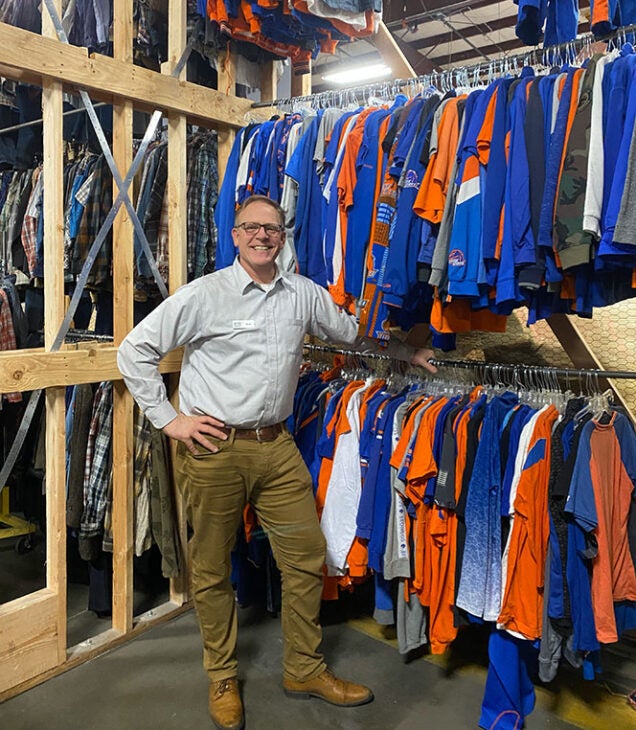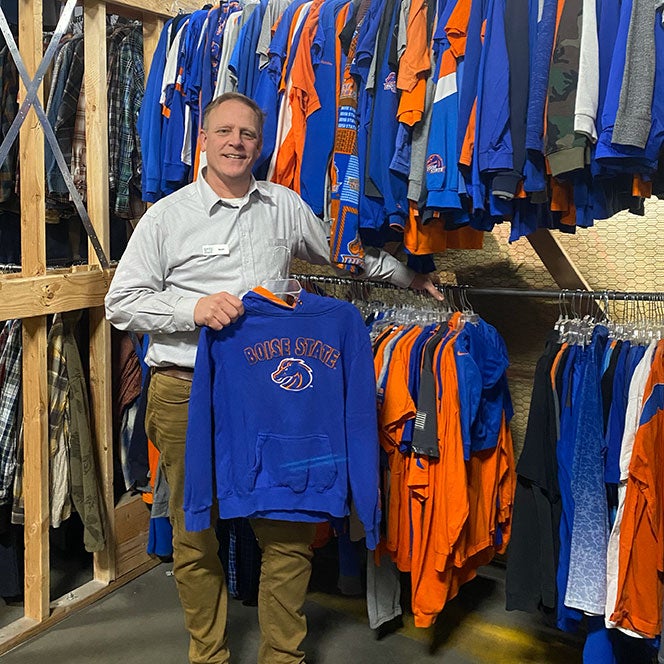
Savvy thrifters know to head to Idaho Youth Ranch for vintage jackets, niche books, quirky art and all manner of goods they might not have known they needed.
What they also might not know is that those bargain buys help fund a priceless treasure that hundreds of families in the state look to, for jobs, mental health support and a variety of other services — or that the organization is helmed by a Bronco.
In many ways, the Idaho Youth Ranch chief executive officer role is the culmination of Scott Curtis’ varied experiences to date. Looked at another way, he’s doing what he’s always done, just at a broader scale.
The path to the Idaho Youth Ranch
Curtis, who grew up in Meridian and graduated from the University of Notre Dame before heading back home, received his Boise State master’s degree in social work in 2002.
He served as vice president and chief advancement officer for the Treasure Valley YMCA from 2016 to 2018; he had been a senior vice president there since 2013. Before that, he led the Caldwell Family YMCA from 2005 to 2013, opening the branch. And prior to that, he was a school social worker in the Boise School District. He serves on the St. Luke’s Treasure Valley Community Board and for a long time was a board member with Catholic Charities of Idaho. He’s been a math teacher; he’s done volunteer work in Chile.
No matter where he’s been and what the resume may have said at the time, it’s been the people in the shadows who have caught his eye.
“I wanted to go into engineering or be a teacher,” he said. “As a teacher, I became more interested in those on the margins, those who were struggling … I kept being drawn to those kids who weren’t doing well.”
A huge impact all across Idaho
It would be hard to overstate the significance of Curtis’ organization, which employs about 550 staff members, mostly full time, in about 30 locations across the state, serving children, teens and families impacted by physical and sexual abuse, domestic violence and neglect; the organization began about 75 years ago as the name suggests, as a ranch in Rupert where troubled youngsters had the chance to build more promising futures.
By the numbers, there now are:
- Two dozen thrift store locations; it should be noted that the store’s are also workforce development centers, in that they provide jobs, coaching and training, often to young people.
- Distribution centers that serve the stores, where goods are sorted and processed. The organization continues to recover from a devastating 2022 fire in Boise distribution center space.
- A youth crisis shelter, which provides short-term residential services in Boise. Last year, the Idaho Youth Ranch Hays House provided more than 4,400 shelter nights for dozens of young people.
- The Residential Center for Healing & Resilience, an intensive psychiatric treatment program and embedded charter school for young people that opened in 2023 on a 250-acre ranch campus in Caldwell; it is the only accredited facility for this population in Idaho.
- Three outpatient counseling offices.
- Tele mental health and adoption services.
- Two equine therapy locations.
- YouthWorks internships, paid work experiences for teens.
Same work, different conversation, and more challenges
The organization’s work — helping young people and families through hard, often tragic, circumstances — has not changed. But the conversation has.

“One of the things that is impacting us right now is people’s awareness of the reality of the behavioral health challenges we’re facing,” Curtis said. “There’s much greater awareness now.
“It used to be, ‘Those other people, people who have those issues.’ Now, everyone has a story. And I think that’s a really great thing, a really healthy thing.”
At the same time, the infrastructure isn’t always there to support the demand. “There’s greater pressure on any resources we have,” he said. “We have greater needs and fewer professionals meeting those needs.”
That said, the community can and does rise to a challenge, and Curtis points to the residential center as an example.
“If you get the right people in the room, you can come up with solutions and try some things,” he said. “Idahoans are proud. We were able to build that debt-free. People and companies stepped up to build it.”
Curtis makes connections between the work he and his staff do in individual lives and the work of building community.
“I think community engagement is critical. I really do believe that building community is the answer, and the way that happens is by building compassion.”
He’s also grateful for his role in that building.
“I’ve been a really fortunate person. I have liked all my jobs. Each has pulled me, has pulled at my heart,” he said. “I’ve been very fortunate in that my social work training and my experiences have led to today. I feel really connected to human beings and the human experience.
“I feel fully alive and connected to humanity.”